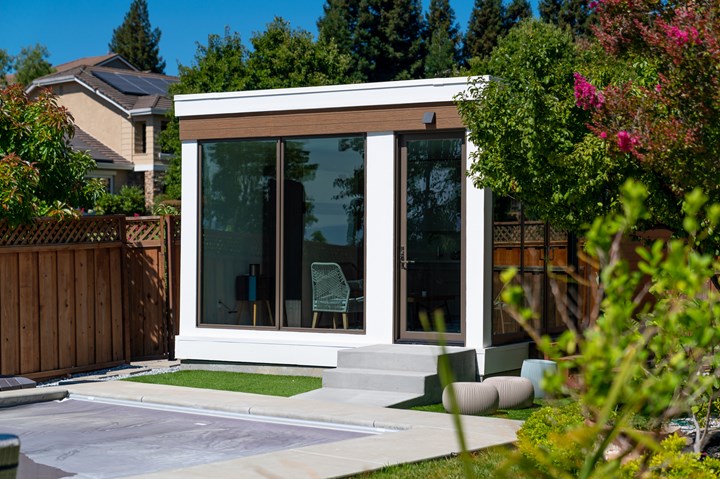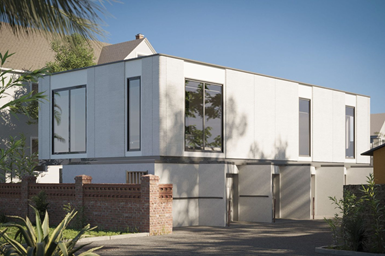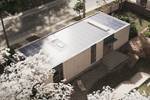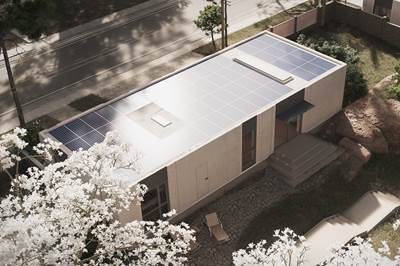Mighty Buildings raises $40 million in Series B funding
Following significant increase in consumer demand, more than $70 million raised from investor to date accelerates growth, expands production capacity, automation and team.

All photo credit: Mighty Buildings
(Oakland, Calif., U.S.) a startup construction tech company that creates homes using large-format 3D printing, advanced materials and automation, announced on Feb. 9 a $40 million Series B funding round following significant consumer demand since its launch in August 2020.
The round was led by Khosla Ventures and co-led by Zeno Ventures, with participation from returning investors Bold Capital Partners, Core Innovation Capital and Foundamental. Mighty Buildings also added several new investors, including ArcTern Ventures, Abies Ventures, Modern Venture Partners, Giant Ventures, MicroVentures, One Way Ventures, Polyvalent Capital and others. Included in list as a result of the funding round, Mighty Buildings reports that it has raised more than $70 million from investors to date.
“Since our launch last year, we’ve seen massive demand and more than a tenfold increase in bookings for our accessory dwelling units (ADUs) product line, with B2B contracts secured for our single family housing (SFH) product line with forward-thinking developers,” says Slava Solonitsyn, CEO and co-founder at Mighty Buildings. “Despite launching in the midst of a pandemic, we are racing to fulfill the demand and orders for 2021 at our Mighty Factory in Oakland, California.”
Launched out in stealth mode five months ago (CW covers Mighty Buildings’ prefabricated building production process), the company says it has already seen an increase in demand for this innovative new way of building. Since launch, Mighty Buildings reports successful production, delivery and installation of numerous accessory dwelling units (ADUs) and are now taking orders for Mighty Houses, the company’s newest product line. The Mighty House line, which incorporate a 3D-printed exterior panelized shell, are available for pre-order as both an ADU and SFH.
Ultimately, the company’s vision is to provide production-as-a-service.
Further, Mighty Buildings says it will be introducing its Mighty Kit System and a new fiber-reinforced material for multi-story projects to the market. With its innovative approach to housing construction includes 3D printing, robotics and a proprietary thermoset composite material termed Light Stone Material (LSM), Mighty Buildings aims to unlock more productive, sustainable and affordable construction.

“Given the rapid growth and emerging opportunity around sustainability and climate tech, we're pleased to support Mighty Buildings in realizing their vision,” says Ryno Blignaut, operating partner at Khosla Ventures. “We're enthusiastic about the ways 3D printing, robotics and automation can be applied to the creation of beautiful, affordable and sustainable net-zero energy homes.”
According to the company, it has also obtained several firsts. This includes obtaining the first UL certification for a 3D-printed building component, the first UL Evaluation Report of a 3D-printed wall construction and becoming what it says is the first company/product certified under the new UL 3401 standard for 3D printing in construction. Mighty Buildings has also received approval under California’s Factory Built Housing program for a residential unit incorporating 3D printing for its current hybrid product.
With this new round of funding, Mighty Buildings plans to accelerate growth and expand its team. The company will continue to scale production capacity with increased automation, and build out its B2B platform for developers with sustainability as a core focus, to meet the demand from forward-looking developers. Ultimately, the company’s vision is to provide production-as-a-service, with builders and architects designing their own structures and then developers using Mighty Factories to produce them at scale.
Related Content
Composite SIPs for more affordable, efficient and sustainable buildings
LiteSIP panels and modules enable framing in days, cutting structural labor and total cost by up to 70% and 30%, respectively, while increasing energy efficiency and durability.
Read MoreSwedish parking garage to incorporate decommissioned wind blades
Architect Jonas Lloyd is working with Vattenfall to design the multistory building with a wind blade façade, targeting eco-friendly buildings and creative ways to remove blades from landfills.
Read MoreU.S. grant is awarded for patented SIP composites formwork system
ConTech stay-in-place (SIP) technology, made from recycled composite materials, replaces the use of reinforcing steel in the construction of flat, elevated concrete surfaces.
Read MoreBrainDrip scales up composite technology to meet current, future energy infrastructure needs
Next-generation composite pipe development with embedded, AI-enhanced health monitoring will modernize new and aging pipelines globally.
Read MoreRead Next
3D-printed prefab homes aim to disrupt construction market
California startup Mighty Buildings’ award-winning prefabricated building production process relies on large-format 3D printing, UV-curable resins, digital design and automation.
Read MoreCeramic matrix composites: Faster, cheaper, higher temperature
New players proliferate, increasing CMC materials and manufacturing capacity, novel processes and automation to meet demand for higher part volumes and performance.
Read MoreCutting 100 pounds, certification time for the X-59 nose cone
Swift Engineering used HyperX software to remove 100 pounds from 38-foot graphite/epoxy cored nose cone for X-59 supersonic aircraft.
Read More












